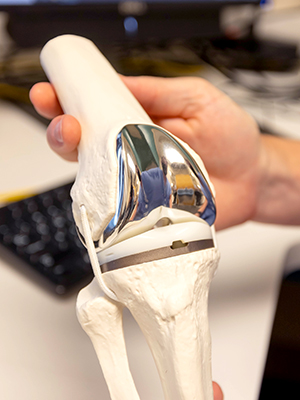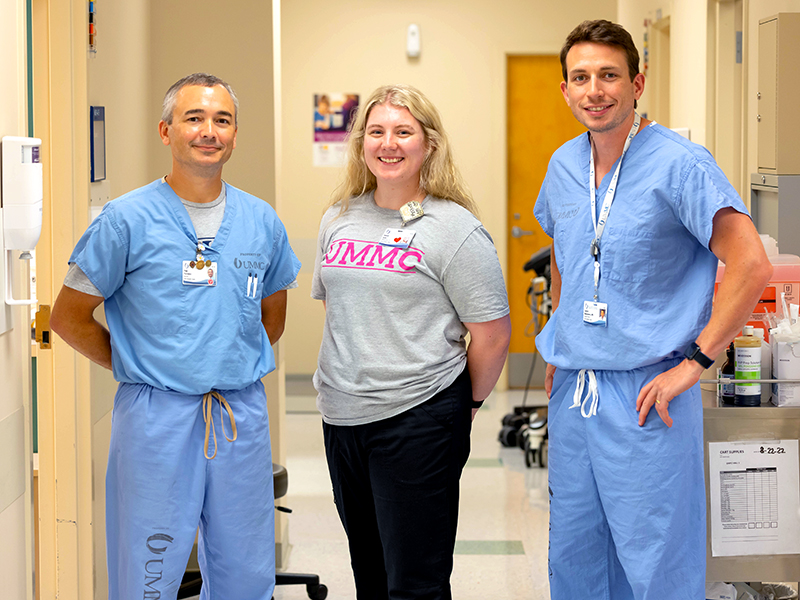Creaky, painful knees: When is it time to see a doctor?
Does your knee pain start when you put your feet on the floor each morning? Does it keep you from enjoying activities you used to enjoy?
Achy knees can often be written off by Baby Boomers and now members of Generation X as part of being 40 and older, but orthopaedic care can take the twinges out of bending and moving your knees.

“If you are experiencing pain in the knee and hip that’s interfering with you doing recreational activities you enjoy or participating in family outings and it’s not responding to over-the-counter medications, then you should seek orthopaedic care,” said Dr. Spencer Montgomery, assistant professor of orthopaedic surgery at the School of Medicine at the University of Mississippi Medical Center.

Care for painful knees can range from non-surgical options such as prescription medication or steroid injections to minimally invasive arthroscopic surgery to knee replacement.
“We have patients come in using a wheelchair because of their knee pain,” said Hannah Taylor, an LPN in the orthopaedic clinic in the University Physicians Pavilion on the UMMC campus. “After following their course of treatment, pain isn’t keeping them from walking.”
Osteoarthritis is one of the most prevalent knee conditions UMMC orthopaedists see, said nurse practitioner Tripp Purviance, along with inflammatory arthritis conditions such as rheumatoid arthritis, psoriatic arthritis, and lupus.
Imaging is an essential part of diagnosing knee pain, Purviance said. “X-rays can show the cause of the pain, which could be arthritis, damage from an injury, or, in rare cases, cancer.”
The frequency of osteoarthritis, a wear-and-tear arthritis that breaks down the cartilage that cushions movements of the knee joint, could be lowered with weight loss, Montgomery said.

“Weight plays a significant role in osteoarthritis,” he said. “A healthy weight can help prolong the life of your knees, and for overweight patients experiencing knee pain, losing weight can help reduce symptoms and reduce the risk of complications if surgery is required.”
The knees bear about one and a half times the body’s weight, so a 200-pound person’s knees are experiencing 300 pounds of force.
When it’s time to see a doctor
If you’ve overdone it or think you may have injured your knee, rest, elevation and ice can ease the pain. It’s time to seek medical attention if your knee pain limits regular daily activities or persists despite a bit of rest. Knee pain that’s getting progressively worse and interferes with activities or wakes you up from sleep is also a reason to see a specialist.
“Getting care for knee pain can make an enormous difference in your enjoyment of life,” Montgomery said.
When to go to the Emergency Department
Knee pain caused by an injury warrants emergency care if the leg appears deformed or your knee can’t bear weight. Intense pain, sudden swelling or a popping sound at the time of injury are also indications for emergency care. Also, knee pain that is associated with swelling and redness of the skin around the joint that’s warm to the touch and fever may indicate an infection that needs to be dealt with quickly.
“The sooner a diagnosis is made, the better a patient’s outlook is,” Montgomery said. “Trying to tough it out through severe symptoms for too long can limit the treatment options available and require more specialized equipment.”
To make an appointment with UMMC Orthopaedics, call (601) 984-6525 and choose option 1, or make an appointment online.
The above article appears in CONSULT, UMMC’s monthly e-newsletter sharing news about cutting-edge clinical and health science education advances and innovative biomedical research at the Medical Center and giving you tips and suggestions on how you and the people you love can live a healthier life. Click here and enter your email address to receive CONSULT free of charge. You may cancel at any time.



